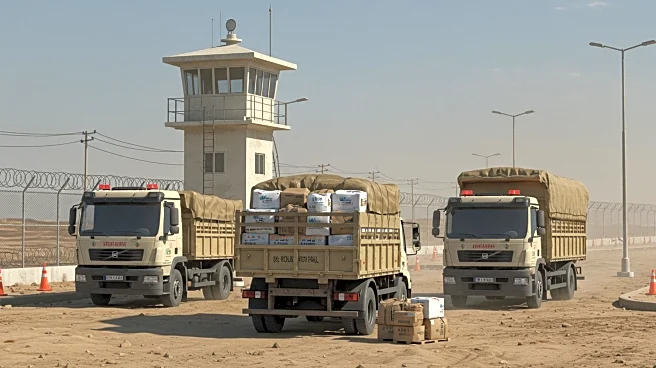What's Happening?
Egyptian truck drivers are experiencing significant delays and rejections while attempting to deliver humanitarian aid to Gaza through the Rafah crossing. The drivers, who have been working for nearly two years, face long waits and rigorous inspections by Israeli authorities. These inspections can last up to 18 hours, and many trucks are turned back after waiting for weeks. Drivers report that only a small fraction of trucks are allowed through, with many supplies rejected for arbitrary reasons. Items frequently denied entry include ICU beds, oxygen tanks, and solar panels, despite being pre-approved. The process is described as humiliating and costly, with drivers enduring harsh living conditions at the border while waiting for permission to proceed.
Why It's Important?
The ongoing restrictions on aid delivery to Gaza have significant humanitarian implications. The blockade has led to severe shortages of essential supplies, exacerbating the suffering of Palestinians in the region. The delays and rejections at the border contribute to the dire situation, as vital medical and food supplies are unable to reach those in need. The challenges faced by Egyptian truck drivers highlight the broader geopolitical tensions between Egypt, Israel, and Gaza, with accusations of complicity in the blockade. The situation has sparked global protests, emphasizing the urgent need for a resolution to ensure the flow of humanitarian aid.
What's Next?
Efforts to facilitate aid delivery continue, with Egyptian authorities maintaining that the Rafah border is open on their side. However, the crossing remains closed on the Israeli-controlled side, posing ongoing challenges. The Egyptian government is under pressure to address the situation, with international protests demanding action. The humanitarian community is likely to continue advocating for smoother access to Gaza, potentially leading to diplomatic negotiations aimed at easing restrictions. The situation remains fluid, with potential for further developments depending on political and military dynamics in the region.
Beyond the Headlines
The blockade and restrictions on aid delivery to Gaza raise ethical and legal questions about the treatment of civilians in conflict zones. The humanitarian crisis underscores the need for international intervention and cooperation to uphold human rights and ensure access to essential supplies. The situation also highlights the complexities of regional politics, with implications for peace and stability in the Middle East. Long-term solutions may require addressing underlying political conflicts and fostering dialogue between involved parties.











